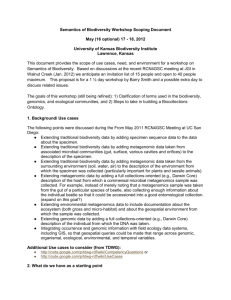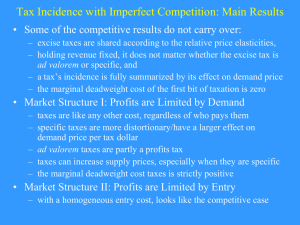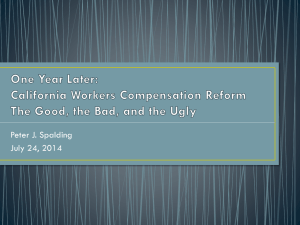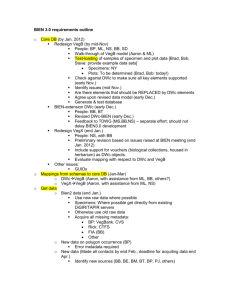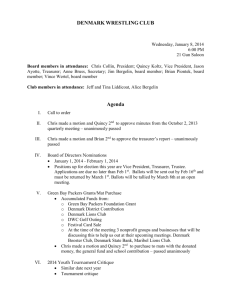Business Ethics CODE: GER 378 C
advertisement
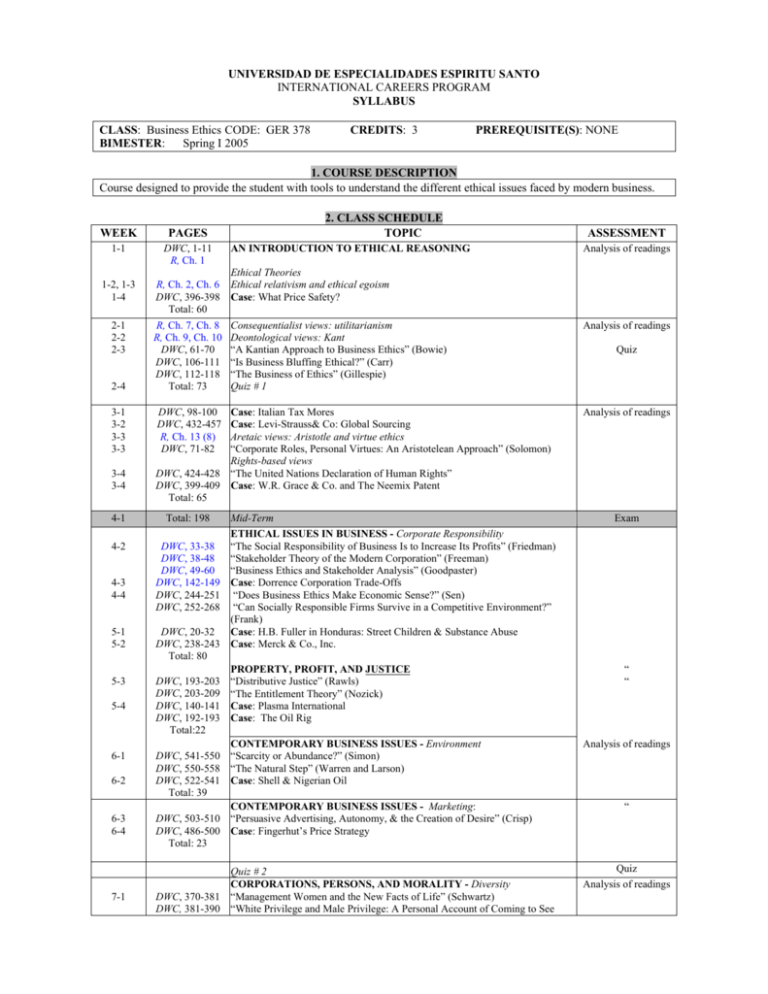
UNIVERSIDAD DE ESPECIALIDADES ESPIRITU SANTO INTERNATIONAL CAREERS PROGRAM SYLLABUS CLASS: Business Ethics CODE: GER 378 BIMESTER: Spring I 2005 CREDITS: 3 PREREQUISITE(S): NONE 1. COURSE DESCRIPTION Course designed to provide the student with tools to understand the different ethical issues faced by modern business. WEEK PAGES 1-1 DWC, 1-11 R, Ch. 1 1-2, 1-3 1-4 R, Ch. 2, Ch. 6 DWC, 396-398 Total: 60 2-1 2-2 2-3 2-4 R, Ch. 7, Ch. 8 R, Ch. 9, Ch. 10 DWC, 61-70 DWC, 106-111 DWC, 112-118 Total: 73 3-1 3-2 3-3 3-3 DWC, 98-100 DWC, 432-457 R, Ch. 13 (8) DWC, 71-82 3-4 3-4 DWC, 424-428 DWC, 399-409 Total: 65 4-1 Total: 198 4-2 DWC, 33-38 DWC, 38-48 DWC, 49-60 DWC, 142-149 DWC, 244-251 DWC, 252-268 4-3 4-4 5-1 5-2 DWC, 20-32 DWC, 238-243 Total: 80 5-3 DWC, 193-203 DWC, 203-209 DWC, 140-141 DWC, 192-193 Total:22 5-4 6-1 6-2 6-3 6-4 7-1 DWC, 541-550 DWC, 550-558 DWC, 522-541 Total: 39 DWC, 503-510 DWC, 486-500 Total: 23 DWC, 370-381 DWC, 381-390 2. CLASS SCHEDULE TOPIC AN INTRODUCTION TO ETHICAL REASONING ASSESSMENT Analysis of readings Ethical Theories Ethical relativism and ethical egoism Case: What Price Safety? Consequentialist views: utilitarianism Deontological views: Kant “A Kantian Approach to Business Ethics” (Bowie) “Is Business Bluffing Ethical?” (Carr) “The Business of Ethics” (Gillespie) Quiz # 1 Analysis of readings Case: Italian Tax Mores Case: Levi-Strauss& Co: Global Sourcing Aretaic views: Aristotle and virtue ethics “Corporate Roles, Personal Virtues: An Aristotelean Approach” (Solomon) Rights-based views “The United Nations Declaration of Human Rights” Case: W.R. Grace & Co. and The Neemix Patent Analysis of readings Mid-Term Quiz Exam ETHICAL ISSUES IN BUSINESS - Corporate Responsibility “The Social Responsibility of Business Is to Increase Its Profits” (Friedman) “Stakeholder Theory of the Modern Corporation” (Freeman) “Business Ethics and Stakeholder Analysis” (Goodpaster) Case: Dorrence Corporation Trade-Offs “Does Business Ethics Make Economic Sense?” (Sen) “Can Socially Responsible Firms Survive in a Competitive Environment?” (Frank) Case: H.B. Fuller in Honduras: Street Children & Substance Abuse Case: Merck & Co., Inc. PROPERTY, PROFIT, AND JUSTICE “Distributive Justice” (Rawls) “The Entitlement Theory” (Nozick) Case: Plasma International Case: The Oil Rig CONTEMPORARY BUSINESS ISSUES - Environment “Scarcity or Abundance?” (Simon) “The Natural Step” (Warren and Larson) Case: Shell & Nigerian Oil CONTEMPORARY BUSINESS ISSUES - Marketing: “Persuasive Advertising, Autonomy, & the Creation of Desire” (Crisp) Case: Fingerhut’s Price Strategy Quiz # 2 CORPORATIONS, PERSONS, AND MORALITY - Diversity “Management Women and the New Facts of Life” (Schwartz) “White Privilege and Male Privilege: A Personal Account of Coming to See “ “ Analysis of readings “ Quiz Analysis of readings GER 378 Business Ethics – Professor Maureen Rase – Spring I, 2005 7-2 DWC, 364-370 Total: 29 7-3 DWC, 335-342 DWC, 323-335 Total: 19 Total: 212 8-1 8-2 Correspondences Through Work in Women’s Studies” (McIntosh) Case: The Case of the Unequal Opportunity CORPORATIONS, PERSONS, AND MORALITY - Whistleblowing “Whistleblowing and Professional Responsibilities” (Bok) Case: The Aircraft Brake Scandal (Optional) Movie: The Insider “ Exam Final Grades 3. WORKLOAD BREAKDOWN ASSIGNMENT Reading the text, case studies Preparation for tests and quizzes Research ALLOTTED HOURS 60 30 6 TOTAL: 96 HOURS 4. METHODOLOGY The format of this course will include lecture, class discussion, case studies, student presentations and research projects. Participation and attendance Quizzes/cases 25% 25% 5. EVALUATION Mid-term exam 25% Final exam 25% 6. CLASSROOM POLICIES A) Examinations and quizzes will cover all material covered during class time plus the assigned readings (whether or not explicitly covered in class lectures). There will be no late exams or quizzes without prior approval from the instructor and, in the case of an exam, the Administrative Director. However, when a student makes up an exam or quiz, he/she will be evaluated over 85% of total points as opposed to 100%. In other words, late assignments will receive a maximum of 85% of the grade. B) Periodically, writing assignments pertaining to the readings will be given. Late writing assignments will be assessed a 30% late penalty for the first day late, with 10% for each additional day. C) Attendance and participation are essential to this course. You are expected to be here both physically and mentally. Read all assigned material in order to participate fully in class discussions. Participation includes the quality of participation, attentiveness, preparation, and the timely completion of all work. Participation will be evaluated by the inclass completion of activities. In-class activities may not be made up. Your grade for class participation may also include oral reports. D) Students will show respect for the thoughts, ideas and contributions of others and will demonstrate mutual respect by arriving on time, being involved in the class, listening attentively, and by eliminating outside distractions (cell phones, side conversations, comings and goings, etc.). E) While research is not only encouraged but required, it is academic dishonesty to copy someone else’s work and present it as your own. This includes information found on the internet. Anyone doing so will receive zero points for that assignment, and the incident will be reported to the administration. DWC 7. BIBLIOGRAPHIC REFERENCES Thomas Donaldson, Particia H. Werhane, and Margaret Cording (Eds.), Ethical Issues in Business: A Philosophical Approach, 7th Ed, Prentice-Hall, 2002. R James Rachels, The Elements of Moral Philosophy, 4th Ed., McGraw-Hill, 2003. Databases: http://search.epnet.com and http://www.blackwellpublishing.com 8. TEACHER INFO Instructor: Maureen Rase B.A. French and Spanish, Western Kentucky University; M.B.A. in International Business, Temple University Office Hours: By appointment, Email: mrase@uees.edu.ec Created on 21/02/2005 8:27 Modified on 19/03/2005 Page 2 de 2

